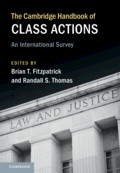Book contents
- The Cambridge International Handbook of Class Actions
- The Cambridge Handbook of Class Actions
- Copyright page
- Dedication
- Contents
- Contributors
- Foreword
- Acknowledgments
- Part I The United States
- Part II The Americas
- Part III Europe
- Part IV Asia and the South Pacific
- Part V Middle East and Africa
- 24 Class Actions in South Africa
- 25 Class Actions and the Regulatory State
- 26 The Israeli Public Class Action Fund
24 - Class Actions in South Africa
A Need for Certainty
from Part V - Middle East and Africa
Published online by Cambridge University Press: 29 January 2021
- The Cambridge International Handbook of Class Actions
- The Cambridge Handbook of Class Actions
- Copyright page
- Dedication
- Contents
- Contributors
- Foreword
- Acknowledgments
- Part I The United States
- Part II The Americas
- Part III Europe
- Part IV Asia and the South Pacific
- Part V Middle East and Africa
- 24 Class Actions in South Africa
- 25 Class Actions and the Regulatory State
- 26 The Israeli Public Class Action Fund
Summary
Class actions were first recognized in South Africa more than twenty-five years ago in the Interim Constitution of the Republic of South Africa, 1993 (“Interim Constitution”). However, it is nevertheless an area of South African law that continues to remain largely unregulated by statute or court rules. Legislative inaction has compelled the judiciary to step in and, through case law, to develop a structure for the adjudication of class actions. South African superior courts should be commended for developing the existing framework within which class actions operate and for giving substance to what could otherwise conceivably have been perceived as an illusory dispute resolution mechanism. The role that our courts have played in this regard is important, especially in view of the increase in recent times in the incidence of class actions.
- Type
- Chapter
- Information
- The Cambridge Handbook of Class ActionsAn International Survey, pp. 481 - 502Publisher: Cambridge University PressPrint publication year: 2021

